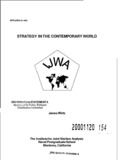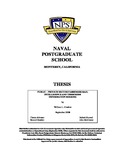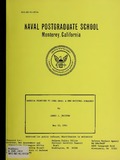Strategy in the contemporary world
| dc.contributor.author | Wirtz, James | |
| dc.date | 2001 | |
| dc.date.accessioned | 2012-03-14T17:02:16Z | |
| dc.date.available | 2012-03-14T17:02:16Z | |
| dc.date.issued | 2001 | |
| dc.identifier.uri | https://hdl.handle.net/10945/658 | |
| dc.description.abstract | Since the end of the Cold war, naval analysts and strategist have faced a crisis. On the one hand, they are well versed with the enduring concepts of strategy, intelligence and the procedures and lessons generated by nearly fifty years of Cold War. On the other hand, there is a widespread notion that traditional ways of doing business undermine new, more coperative opportunities that have arisen in international politics since 1989. This critcism is reflected in attempts at New Thinking which places societal, environmental and even Utopian solutions to military and intelligence problems ahead of traditional concepts of strategy. At the same time, events like the Gulf War, Bosnia, Kosovo, Desert Fox and intelligence surprises (Indian and Pakistan nuclear testing) demonstrate a mastery of the principles of intelligence and strategy are the conerstone of U.S. foreign and defence policy.-- Report documentation page. | en_US |
| dc.format.extent | 1 v. (various pagings): ill.;28 cm. | en_US |
| dc.publisher | Monterey, California. Naval Postgraduate School | en_US |
| dc.title | Strategy in the contemporary world | en_US |
| dc.type | Technical Report | en_US |
| dc.contributor.corporate | Naval Postgraduate School (U.S.): Institute for Joint Warfare Analysis. | |
| dc.contributor.school | Institute for Joint Warfare Analysis | |
| dc.subject.author | National security. | en_US |
| dc.subject.author | Strategy. | en_US |
| dc.description.funder | ONR# N001400WR20307. | en_US |
| dc.identifier.oclc | ocm299571143 | |
| dc.identifier.npsreport | NPS-IJWA-01-005 | |
| dc.description.distributionstatement | Approved for public release; distribution is unlimited. |
Files in this item
This item appears in the following Collection(s)
-
All Technical Reports Collection
Includes reports from all departments. -
Institute for Joint Warfare Analysis (NPS-IJWA)





